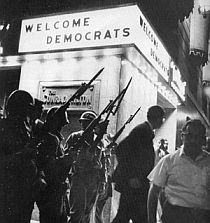 |
| Nelson Rockefeller speaks (and is booed), Republican convention, 1964 |
We have been told that a contested Republican convention is quite unlikely, but in fact, it is looking like the most probable result of the primary season. Trump so far has won about 40% of the delegates. To win on the first ballot in Cleveland, he needs to win about 60% of the remaining delegates. This is obviously unlikely. Even if Trump has not started to decline—analysis suggests Cruz's unexpectedly strong showings recently have more to do with a collapse in Rubio's support, while Trump's has held fairly steady—something new would presumably be needed to boost him this much. In the meantime, the Republican “establishment” and its big donors are gathering to stop Trump. If Rubio wins Florida, and Kasich wins Ohio, Trump realistically cannot get the delegates to win. The fact that both Rubio and Kasich are still in the race is strong evidence they and their teams think the convention will be contested—they cannot now win outright, but arriving at the convention with a healthy block of delegates gives them bargaining power.
 |
| Democratic convention, 1968 |
Cruz has said there would be a general voter revolt if there were a contested convention. I doubt it. Conventions in the US used always to be contested, they still are in the UK or Canada, and the excitement of it, to my mind, is far preferable to the current boring pantomime performance. Of course, you do not want strife like there was at the Cow Palace in 1964, or Chicago in 1968. But most contested conventions are still fairly mannerly affairs. They always are, in Canada. The worst was perhaps the Tory convention in 1967, but even then, when Diefenbaker put his name in contention at the last moment, after a speech in which he scolded the entire party, another candidate (I think it was Donald Fleming) lent Dief his marching band for the latter's grand entrance.
 |
| PC convention 1967 |
This is, in sum, the “party establishment” against which the Republicans are in open revolt. As it turns out, the establishment is far more powerful in the other party. Yet Democrats seem more sanguine about it, for now.
However, a piece in the Huffington Post contests this notion. Its argument, in brief: 1) these are politicians. 2) If Sanders wins the primaries, they would be seen going against their constituents' wishes. 3) polls in any case show Sanders running stronger than Clinton against Republican opponents. 4) these guys want to keep their jobs, and do not have a suicide wish.
The article goes on to say that Sanders has a very good chance of outperforming Clinton in the remaining primaries. Clinton has so far racked up big wins in the Southern states, and so far has done little better than Sanders. Almost all of the Southern states have now voted. From here on in, it should be better Sanders territory.
In sum, this could be the most interesting political season in the US for at least the past forty years
.













No comments:
Post a Comment